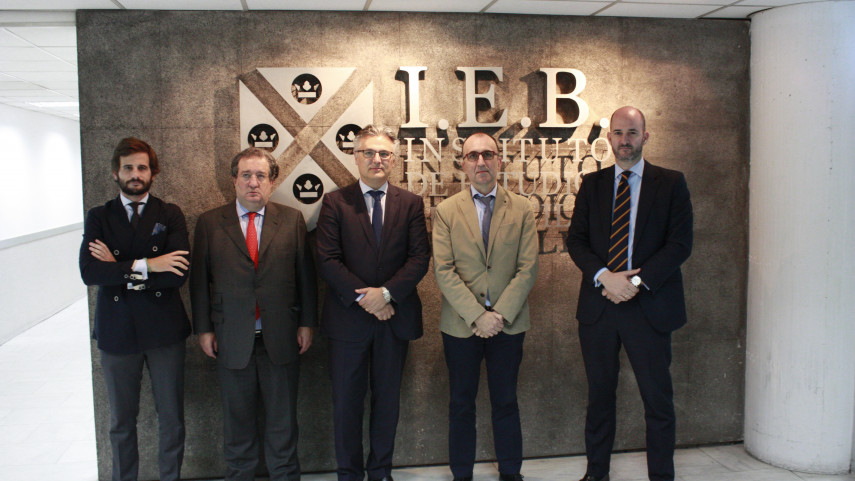Nota de Prensa
FRI 18.11.2016
Finance college the IEB (Instituto de Estudios Bursatiles) staged a conference on Thursday entitled LaLiga's Economic and Financial Controls and the Reduction of Debt Among Professional Football Clubs. This event saw experts from the sector outline how the industry's indebtedness has been reduced considerably in recent years, hand in hand with a steady shift towards professionalisation of Spanish clubs' management and the increasing application of Financial Fair Play concepts.
The conference was moderated by Luis Cazorla, a professor of commercial law, specialist in sports law and managing partner of the firm Cazorla Abogados. It featured participation from Javier Gomez, LaLiga's corporate managing director; Alberto Palomar Olmeda, a judge for contentious administrative proceedings, senior professor of administrative law and sports-law expert; Jose Maria Duran, the general manager of Getafe CF and former CFO of RCD Espanyol; and Miguel Garcia Caba, a doctor of law and specialist in sports law.
Spanish professional football, headed by LaLiga and its competitions, is at the forefront of the country's professional sport sector, which is a major wealth generator. Indeed, putting together direct and indirect revenues, the beautiful game accounts for approximately 0.75% of Spain's GDP at present, a figure that should only increase in the future in view of the steadfast efforts that have been ongoing for several years to boost football's finances in the country.
"The financial control system implemented by LaLiga is a benchmark in Europe and the results obtained over the last four seasons, since it was introduced, support this status. As well as being pioneering because of its use of a priori controls and its highly detailed nature, it will serve as the platform to enable LaLiga to achieve the targets set for the next four years," said Gomez.
Cazorla echoed this sentiment, highlighting the innovativeness of applying a priori controls that, unlike UEFA's Financial Fair Play scheme, dictate clubs' budgets in advance, rather than reacting after the fact.
On 30 June 2012, before the advent of LaLiga's current financial control system, the total debt of Spanish clubs stood at around €2.431 billion. This figure has since been slashed and Cazorla sounded an upbeat note, predicting that Spanish football will be "in a very healthy financial state" by 2020, with a "1:1 ratio between clubs' net debt and their revenues."
The IEB highlighted the importance of football institutions having individuals at their disposal who are skilled and qualified in finance and law, in order to optimise their financial management. These institutions form part of an economic sector that has the potential to further increase its contribution to the country’s finances. "In football, talent isn't just displayed on the pitch. For LaLiga's financial and economic controls to be regarded as the standard for all of Europe to follow, it’s crucial that we can count on experts to carry out debt control and proper debt monitoring," stressed Alvaro Rico, the IEB's general secretary.
Palomar Olmeda, for his part, explained that financial controls have undoubtedly been a key factor in driving the economic growth of Spanish professional sport and boosting its credibility, with football a prime example. He also explored some of the complexities surrounding the legal status of the financial control system.
One of the main challenges that Spanish football – as the most representative arm of Spanish sport – has faced in recent years has been to reduce debt ratios and improve the financial solvency of its clubs.
With regards to this matter, and according to statistics from LaLiga for the 2011/12 season up until 2014/15, the net debt of Spanish clubs, aside from Real Madrid and FC Barcelona, was reduced by €609.6m to €1.8218bn in this period. This debt reduction, alongside the increase in revenues of these clubs, meant that the ratio of net debt versus net turnover was reduced from 2.8 in the 2011/12 season to 1.8 in 2014/15. It is estimated that this ratio was about 1.3 for last term, while for the current campaign it may be below 1.
Last but not least, the point was made at the conference that another vital contributor in the bid to clean up Spanish football's finances has been the joint selling of television rights: "Joint selling has doubled the price of TV rights, together with measures such as protection against piracy and the rolling out of new kick-off times, which make it possible to attract a greater audience."
© LALIGA - 2016






